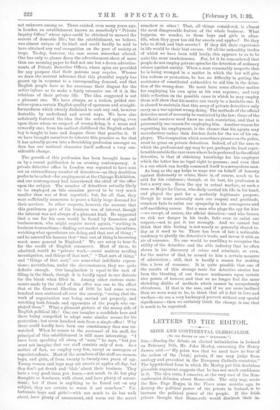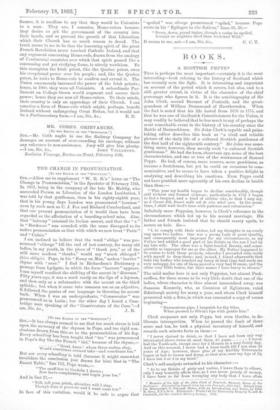LETTERS TO THE EDITOR.
IRISH AND CONTINENTAL CLERICALISM.
[To THE EDITOR OP THE 45 SPECTATOR' Stn,—During the debate on clerical intimidation in Ireland, on February 10th, Mr. John Morley, correcting Sir Henry James, said :—" My point was that we need have no fear of the action of the [Irish] priests, if one may judge from analogy and precedent in the European Catholic countries.' The hypothetical form in which Mr. Morley put this doubtless plausible argument suggests that he has not much confidence in it. The idea rests, I conceive, at the very root of the Non- conformist delusion about Home-rule. The only way, wrote the Rev. Page Hoppe, in the Times some months ago, to, destroy the political power of the priests in Ireland, le to increase the political power of the people. If the Irish priests thought that Home-rule would diminish their his 'thence, it is needless to say that they would be Unionists to a man. They are, I conceive, Home-rulers because they desire to get the government of the country into their hands, and so prevent the growth of that Liberalism which their Church has so much reason to dread. The truth seems to me to be that the leavening spirit of the great French Revolution never touched Catholic Ireland, and that any argument concerning Home-rule, drawn from the analogy of Continental countries over which that spirit passed like a consuming and yet vivifying flame, is utterly worthless. To this exemption the Irish priest, like the Quebec priest, owes his exceptional power over his people ; and, like the Quebec priest, he looks to Home-rule to confirm and extend it. The Union enormously increased the power of the Irish priests ; hence, in 1800, they were all Unionists. A subordinate Par- liament on College Green would augment and secure their power; hence they are now all Home-rulers. To their minds, their country is only an appendage of their Church. I can conceive a form of Home-rule which might, perhaps, benefit Ireland without endangering Great Britan, but it would not be a Parliamentary form.—I am, Sir, &c., E. D.



































 Previous page
Previous page